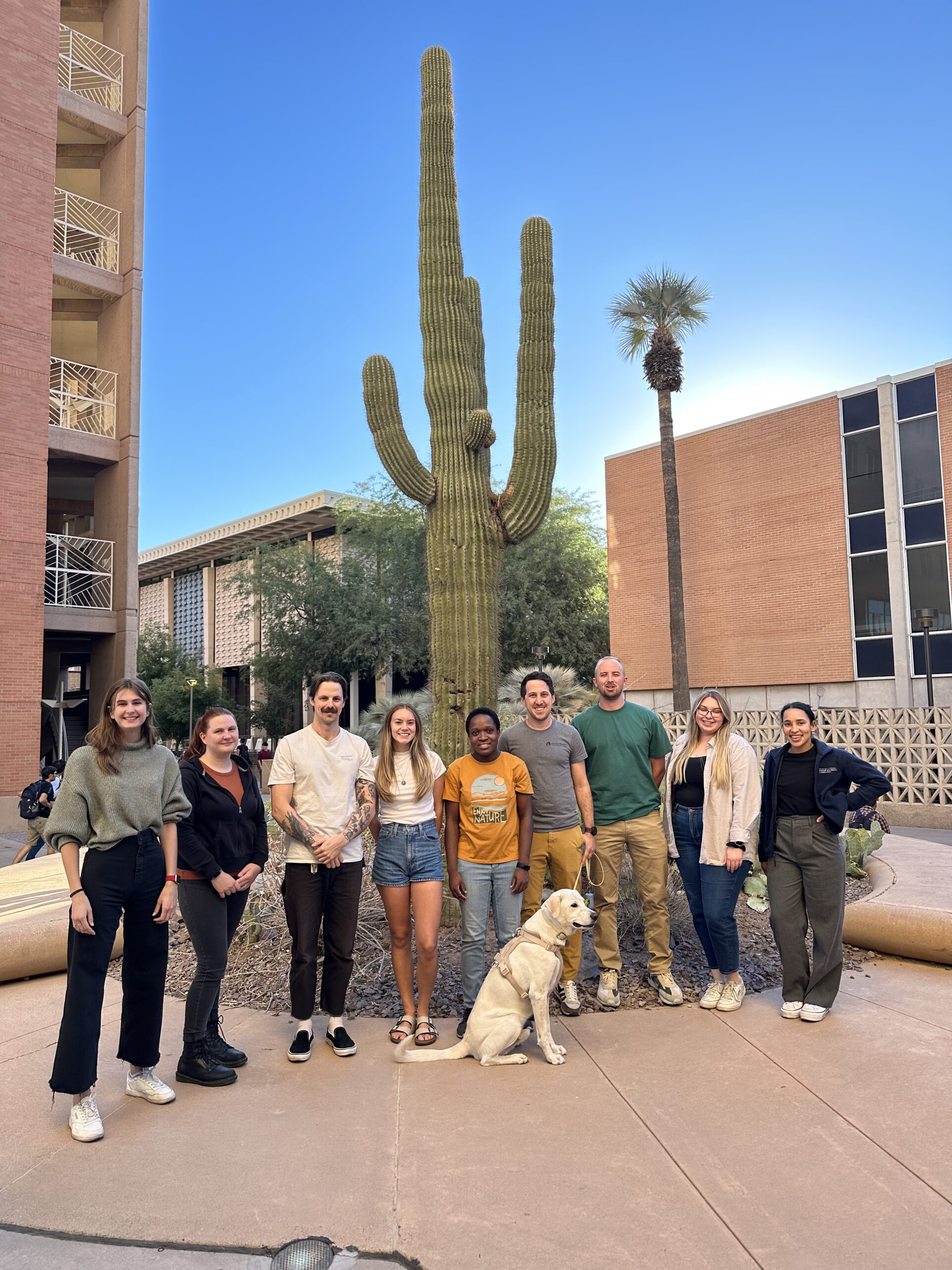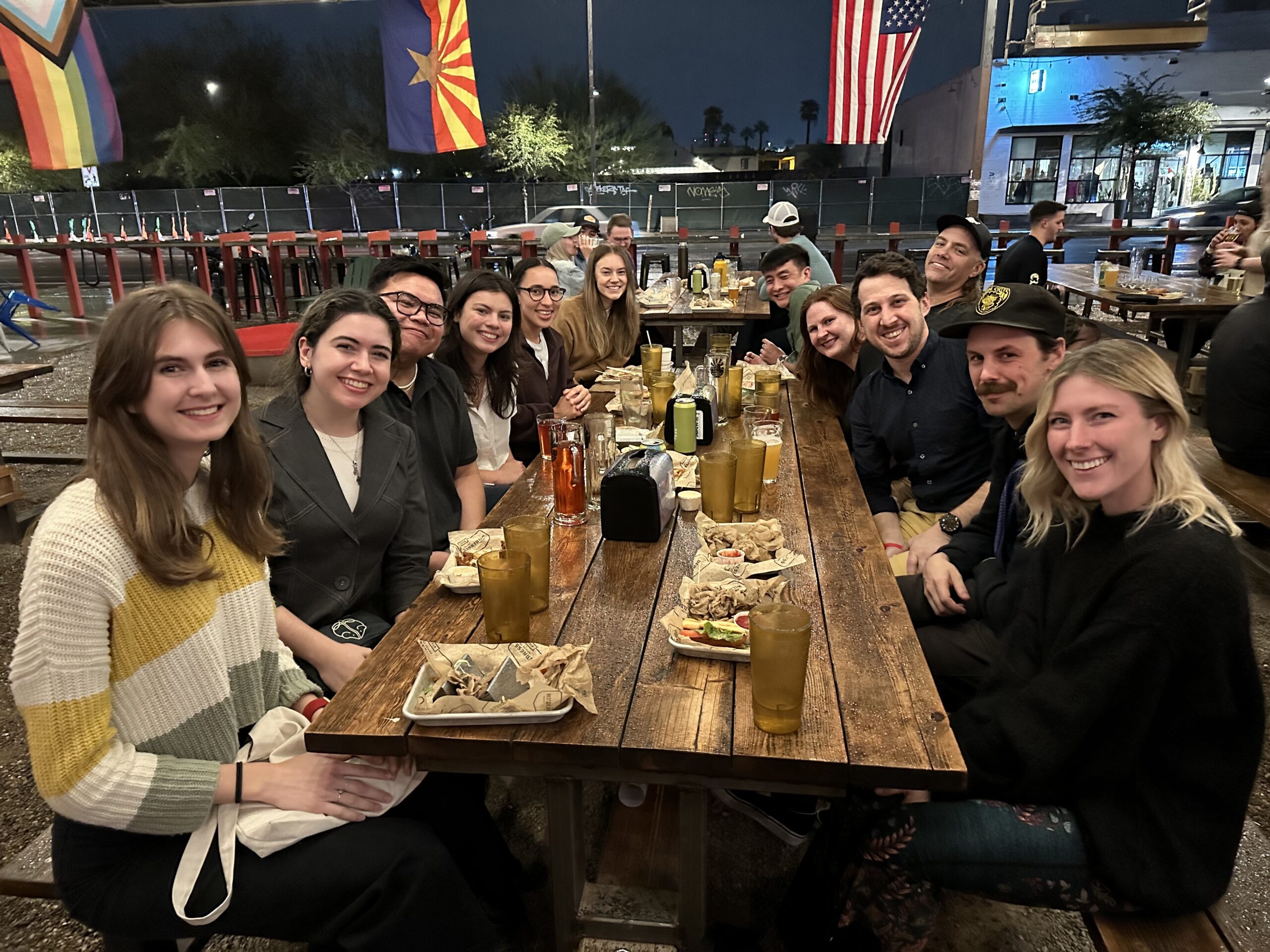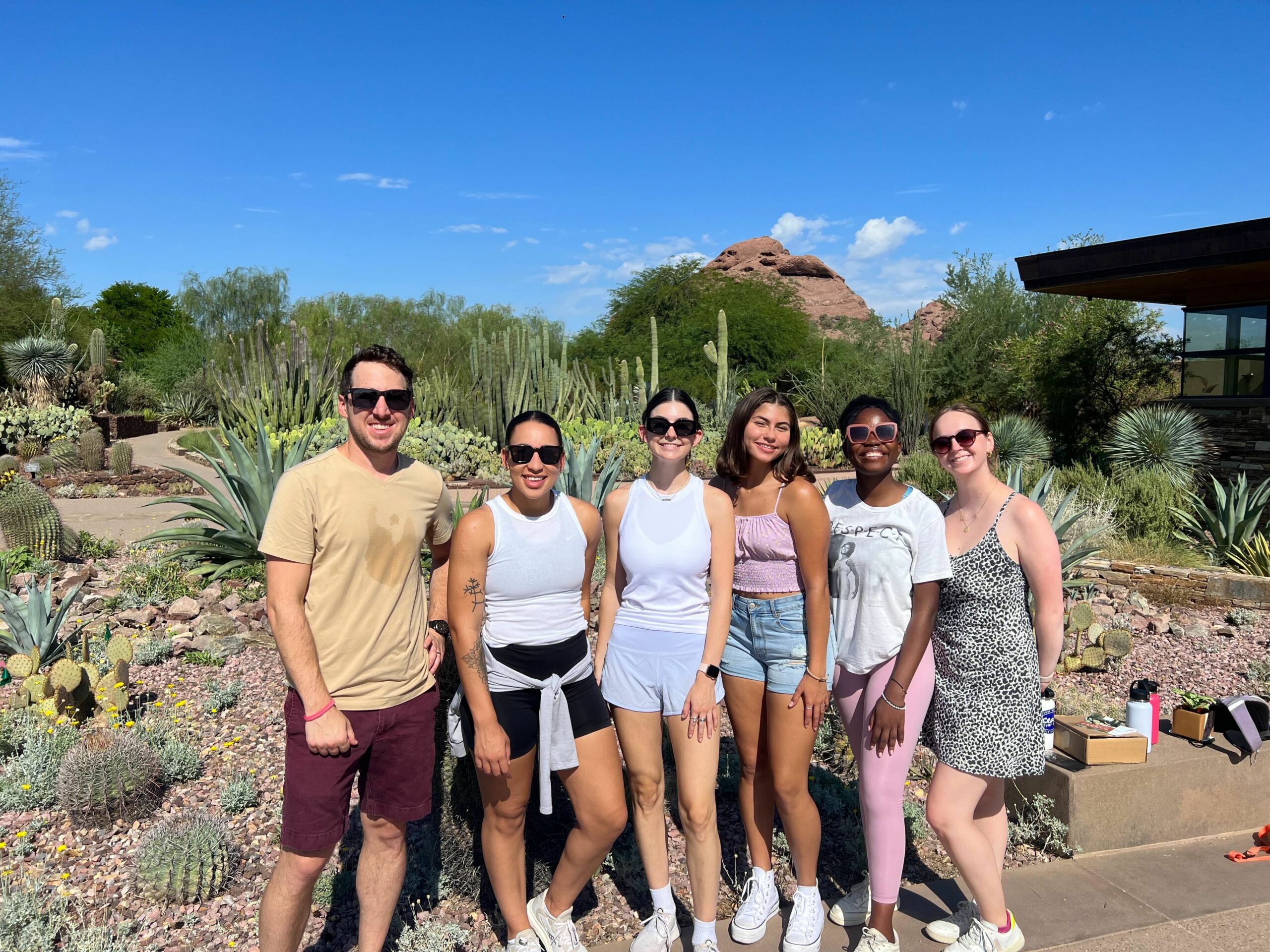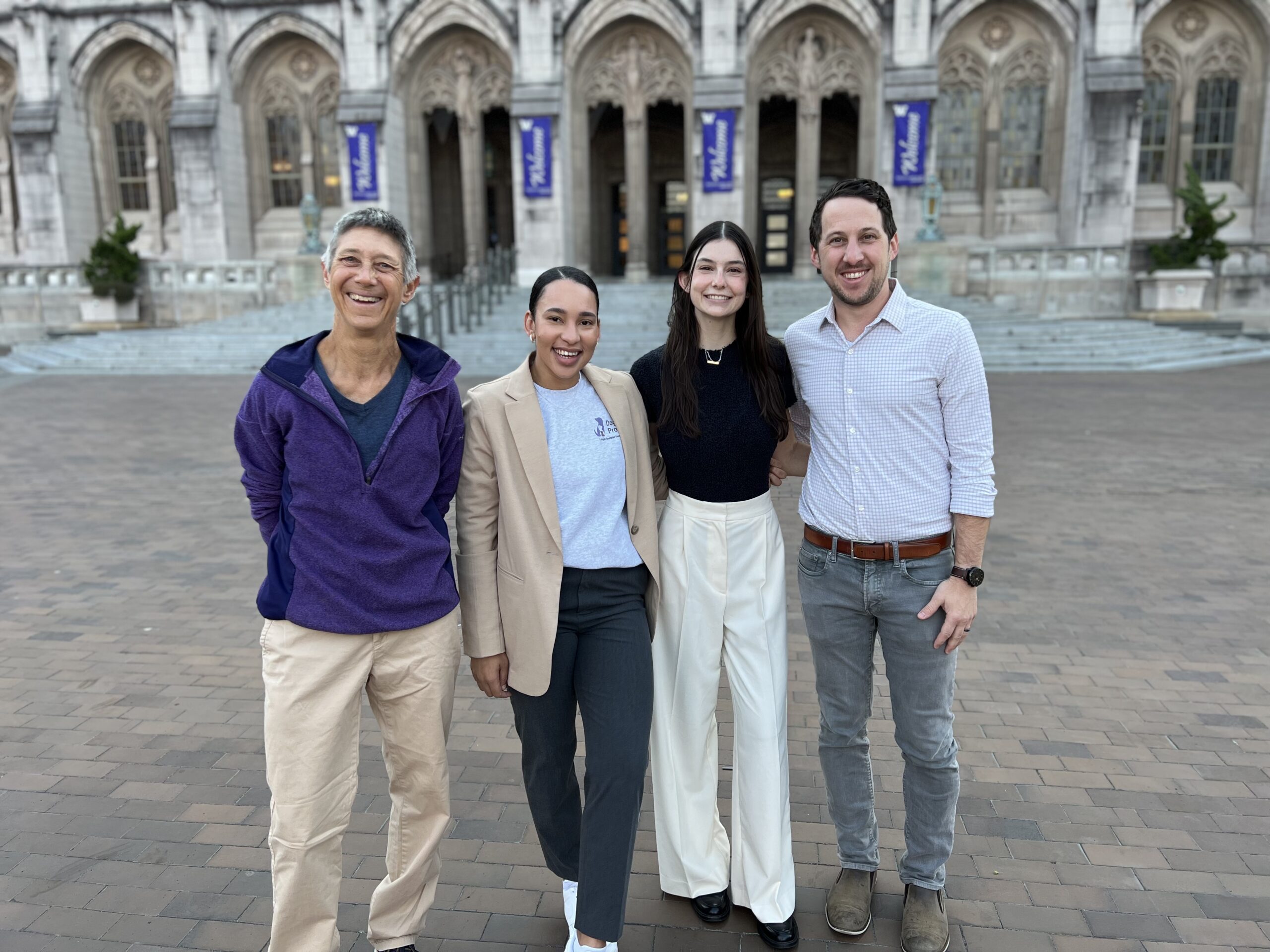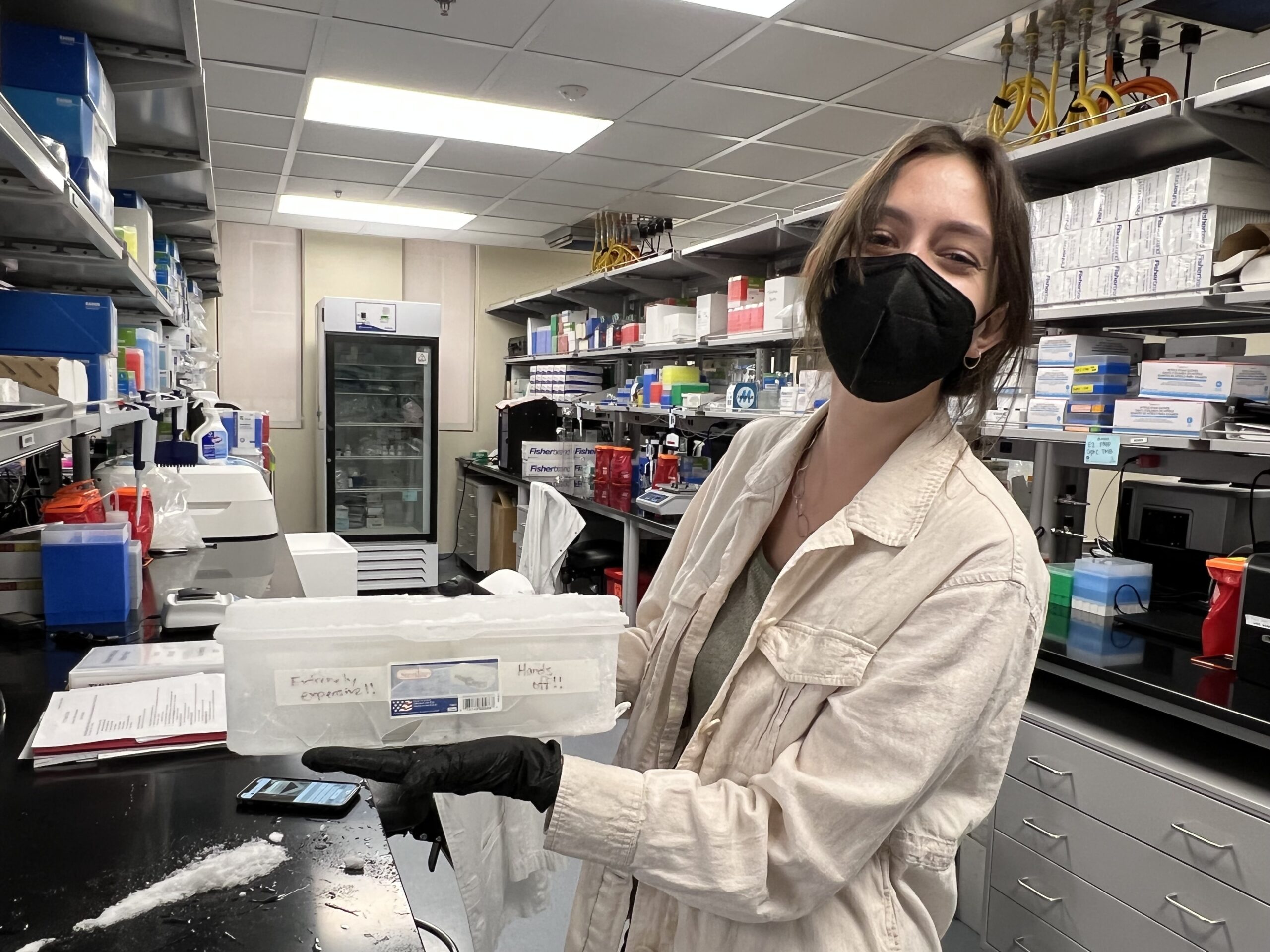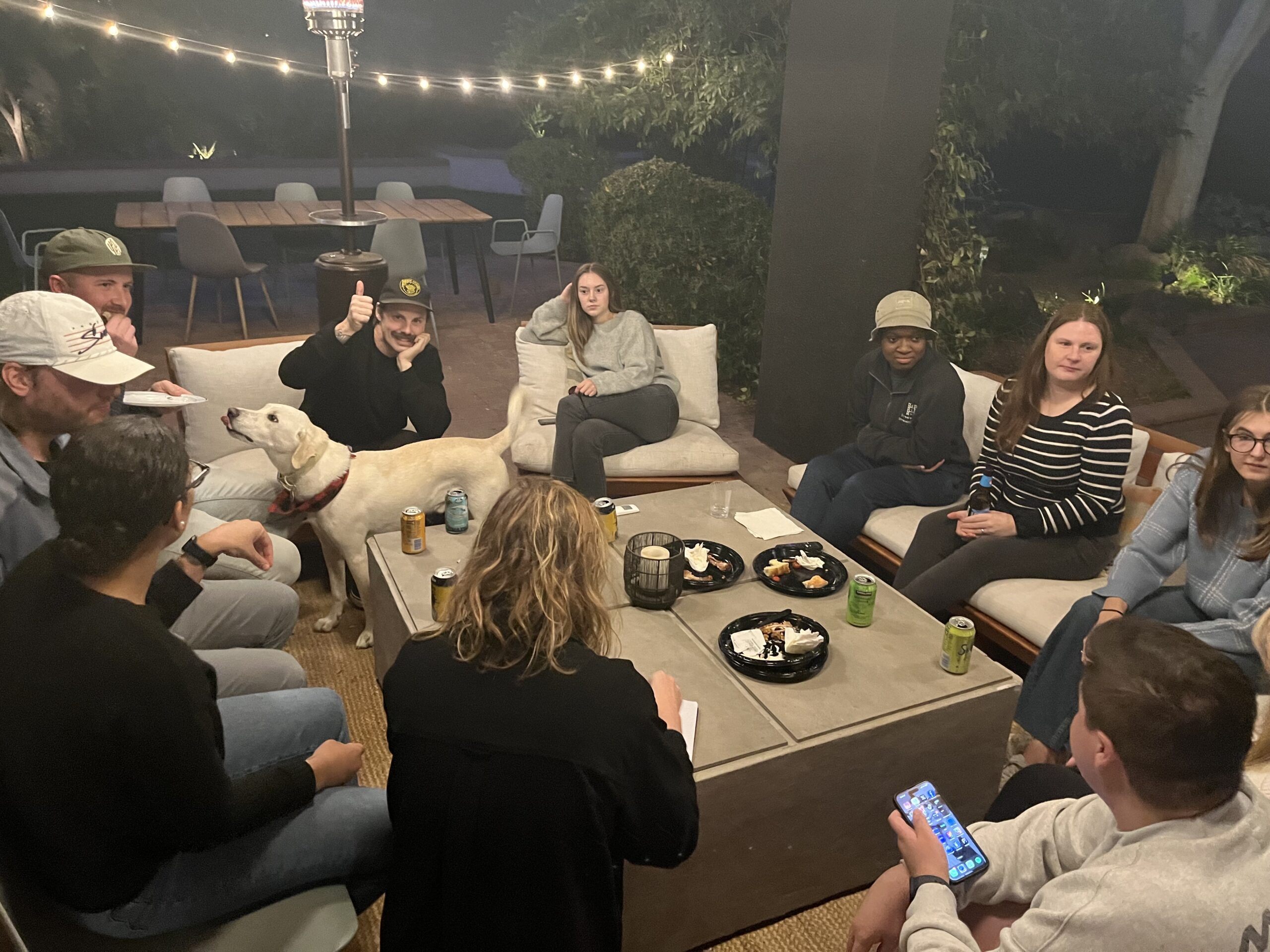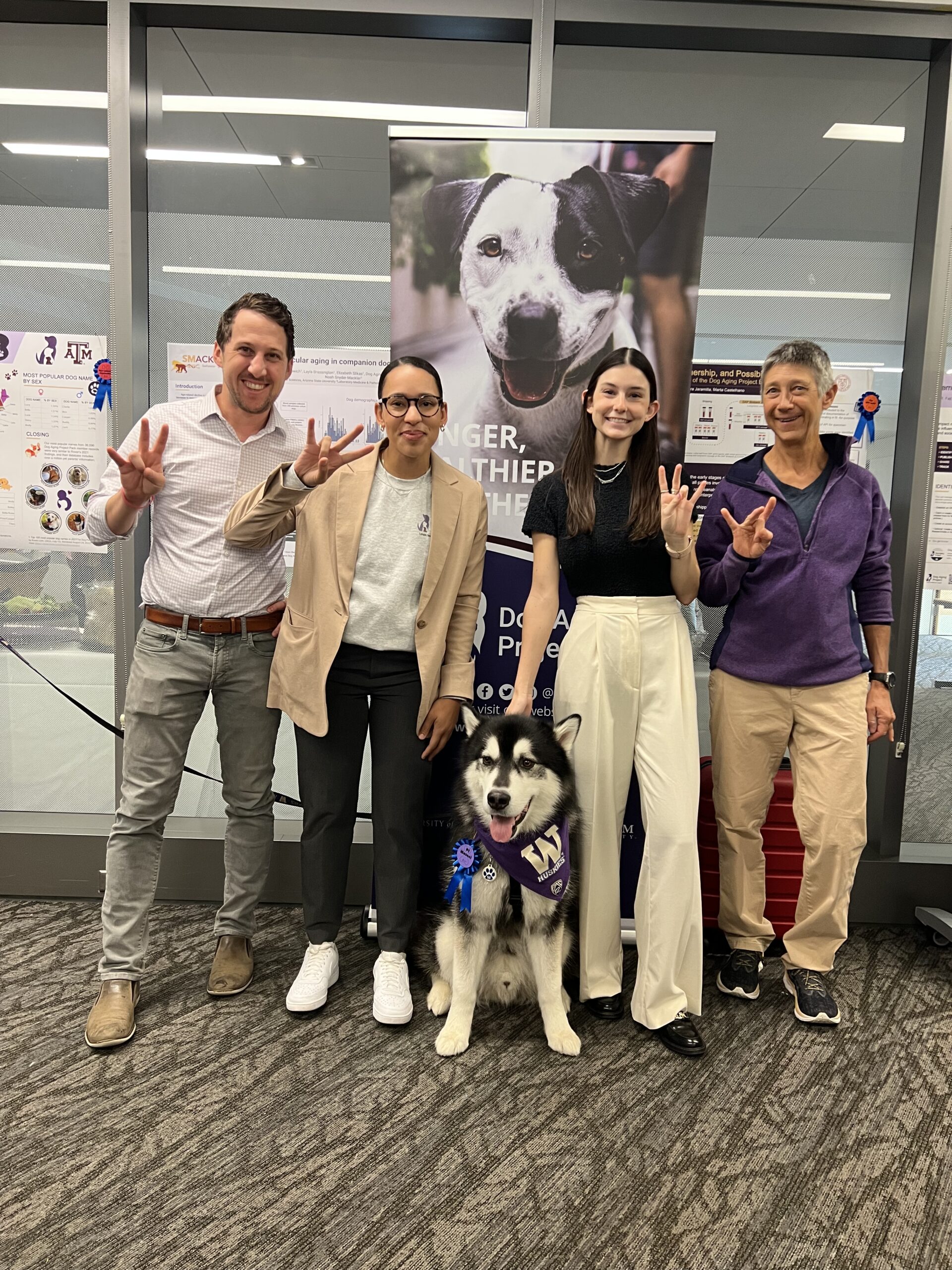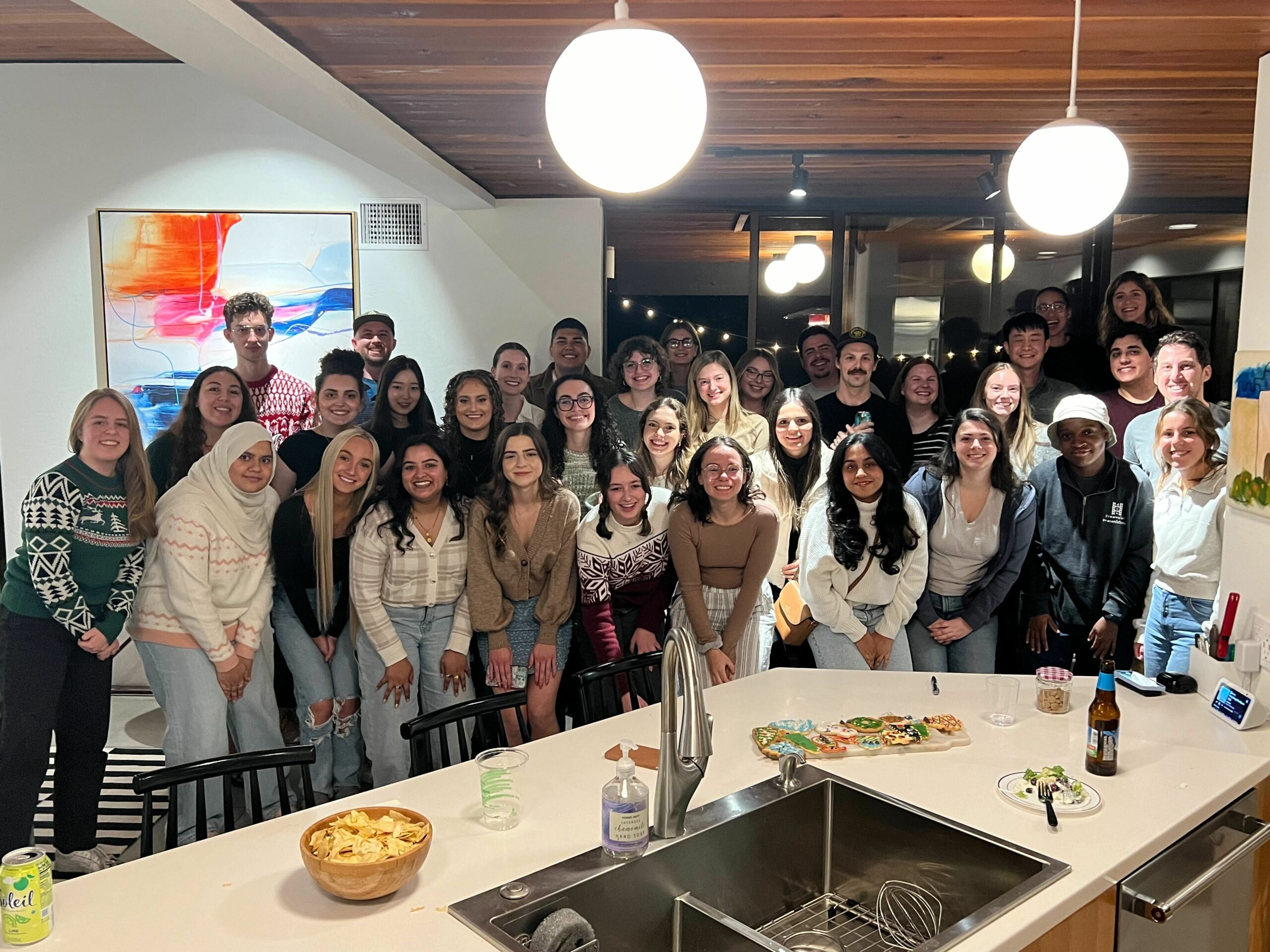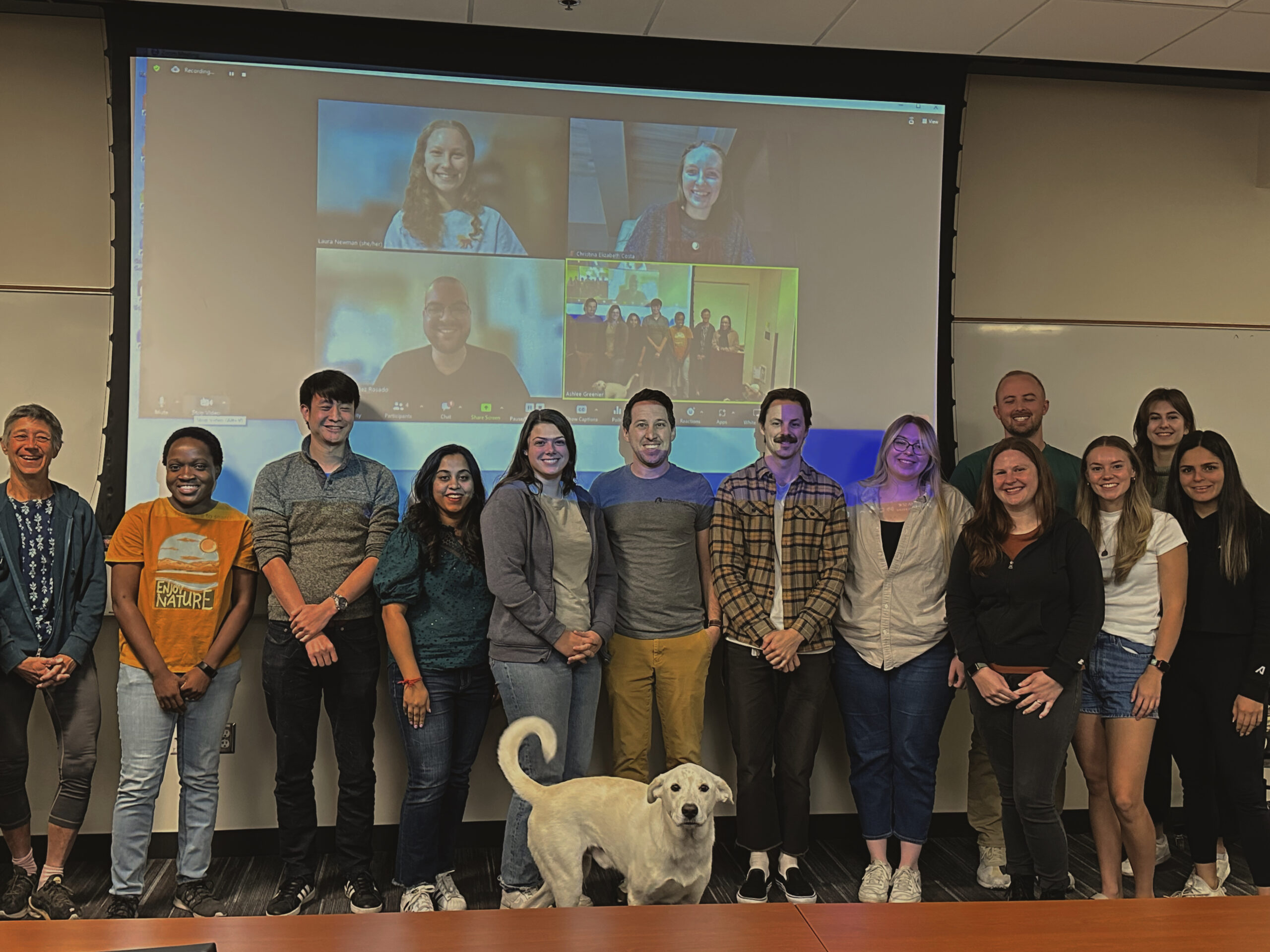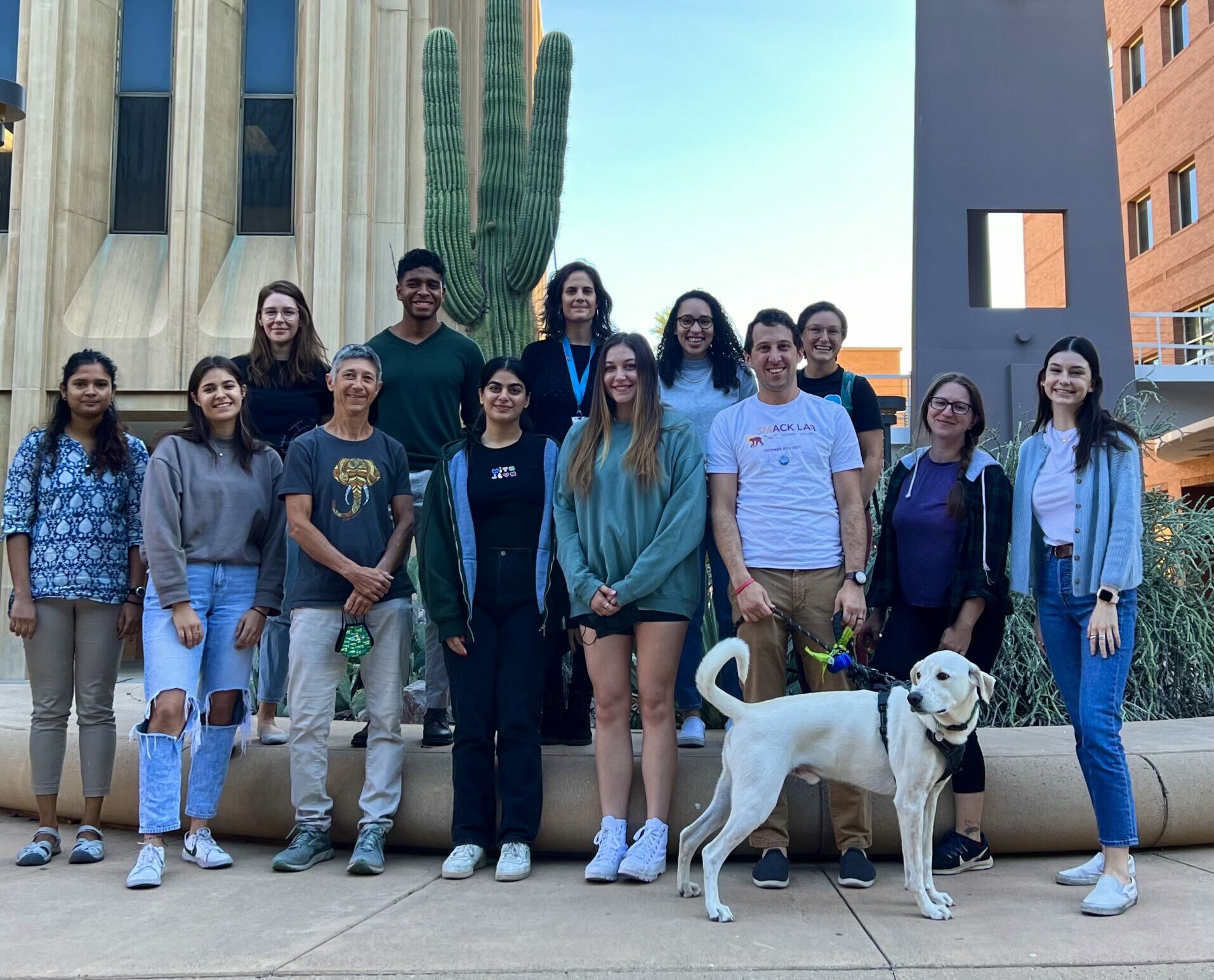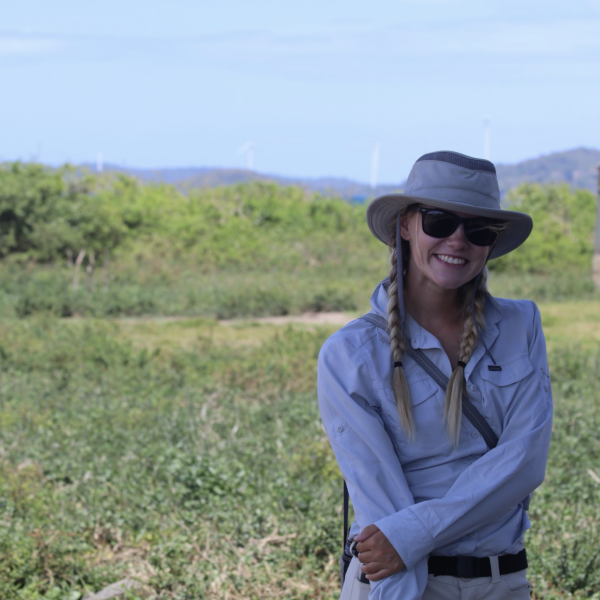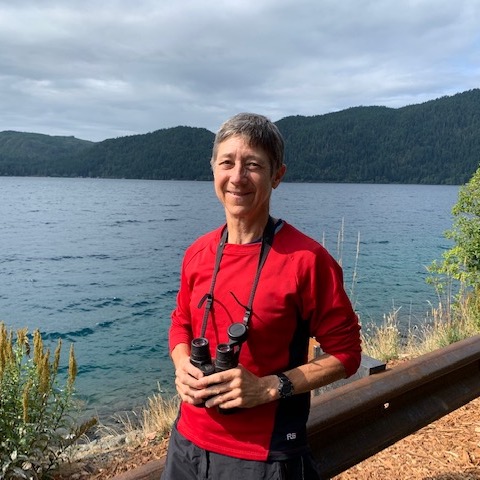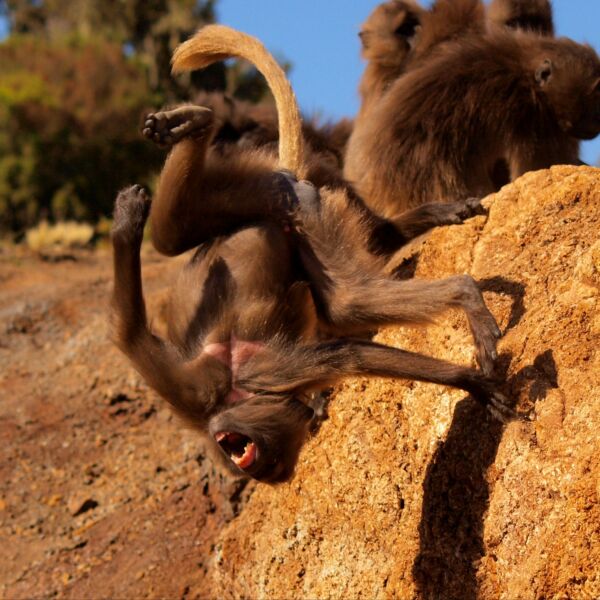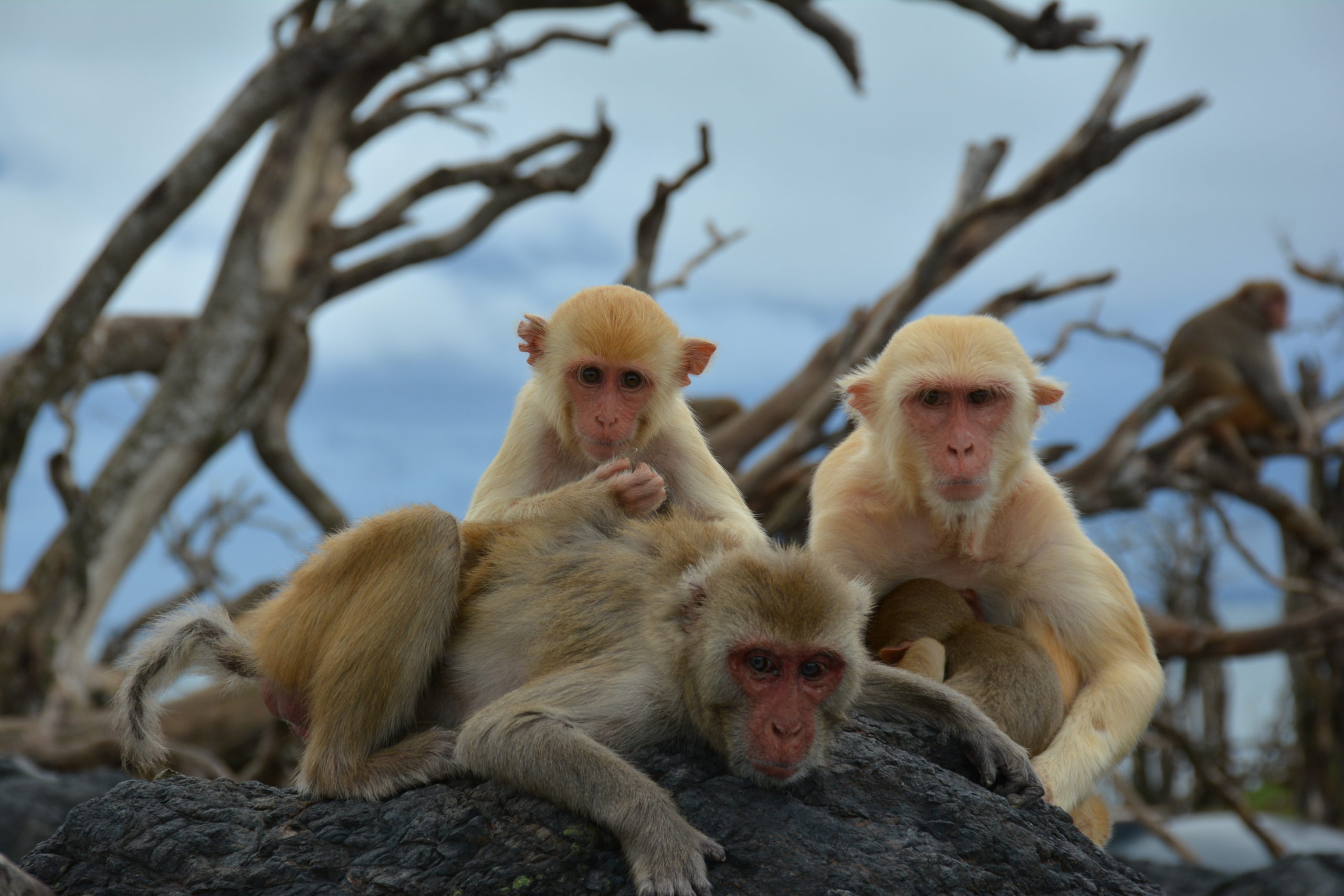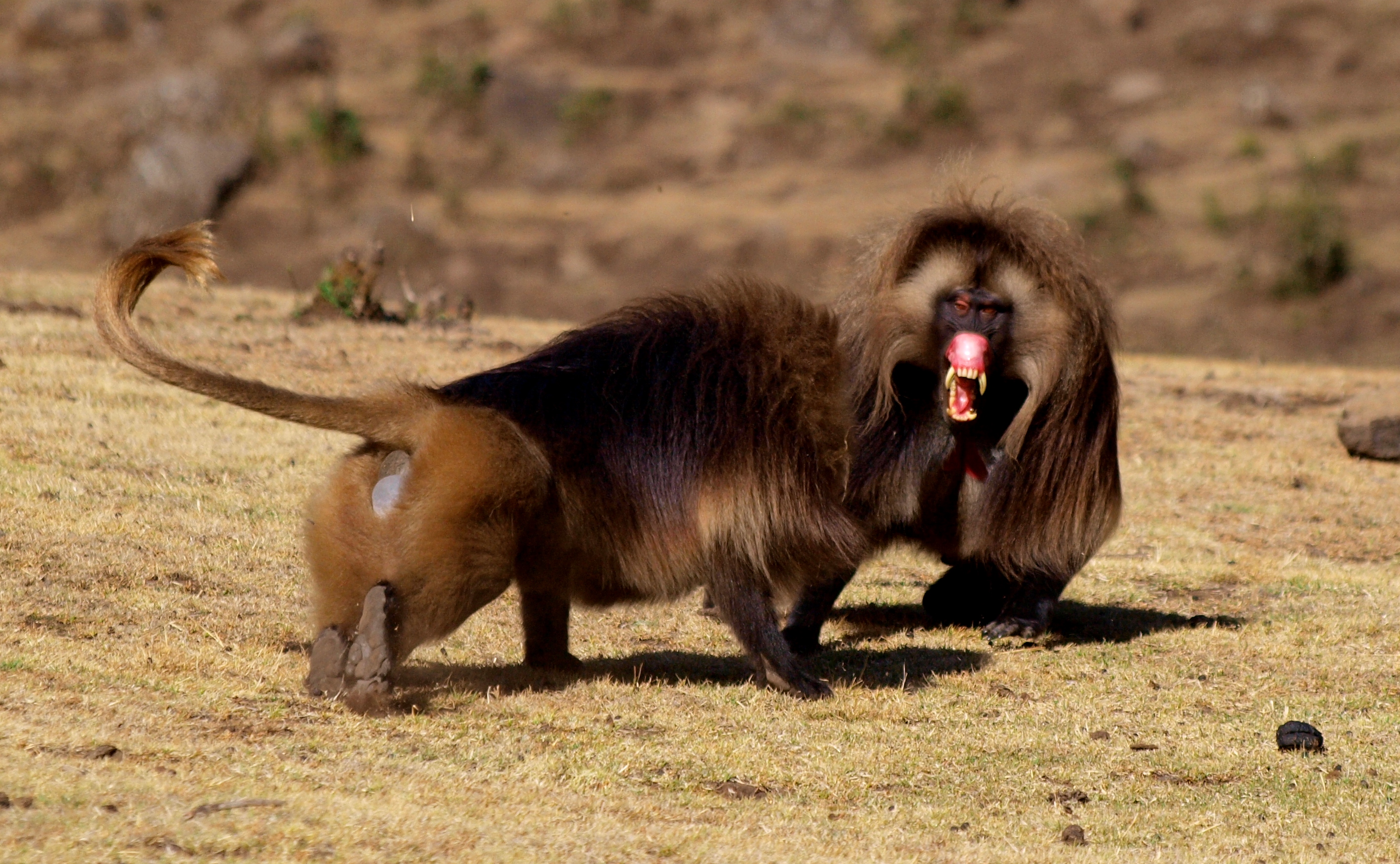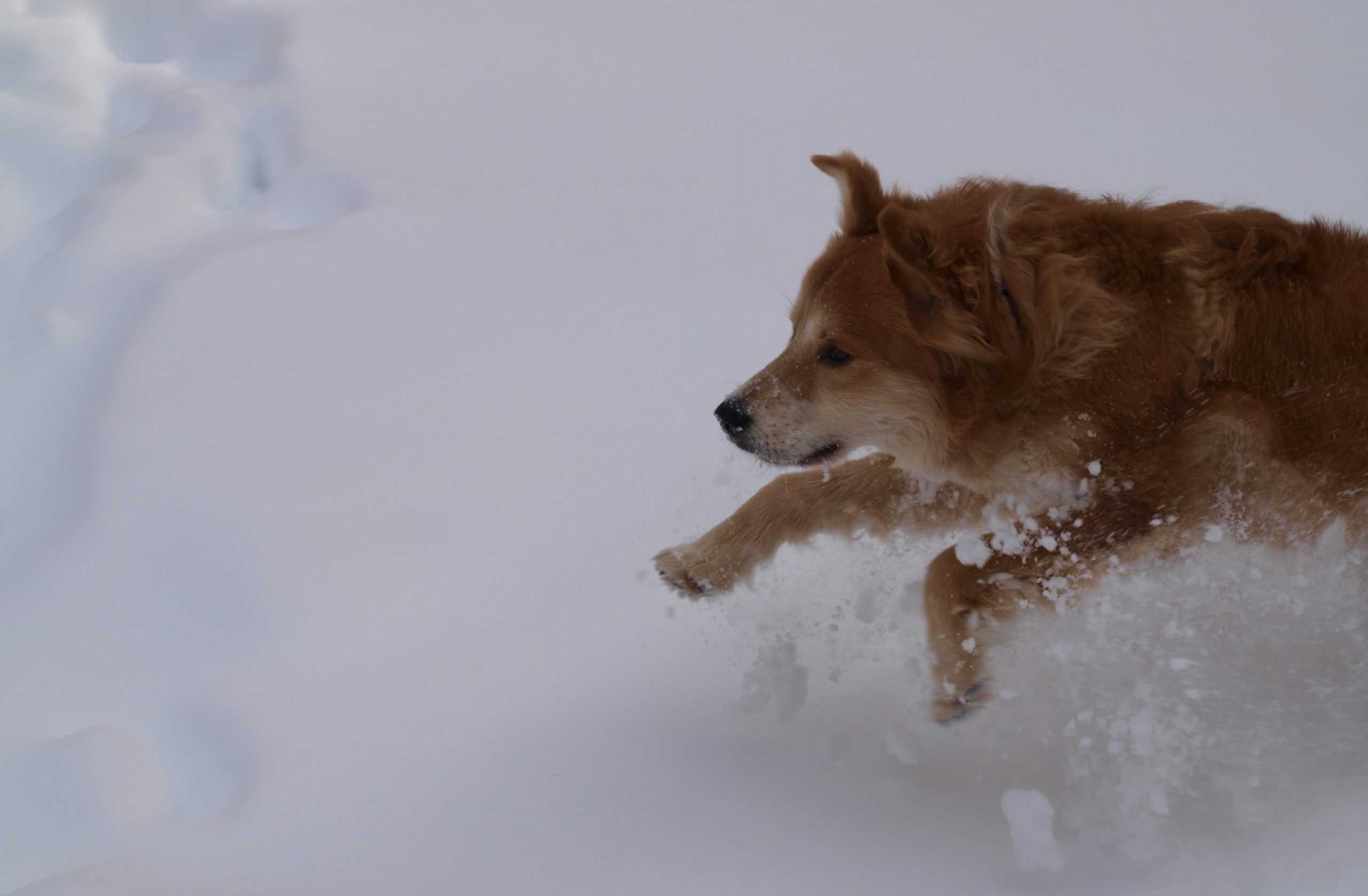SMack Lab members highlighted in bold
*equal contribution; **corresponding
Pre-prints
McCoy BM*, Mariner BL*, Cheng CF, Slikas E, Adjangba C, Greenier A, Brassington L, Marye A, Harrison BR, Partida-Aguilar M, Bamberger T, Algavi Y, Muller E, Harris A, Rout E, The Dog Aging Project Consortium, Avery A, Borenstein E, Promislow DEL, Snyder-Mackler N**. “Aging at scale: Younger dogs and larger breeds from the Dog Aging Project show accelerated epigenetic aging.” bioRxiv doi: 10.1101/2024.10.03.616519
Mariner BL*, McCoy BM*, Greenier A, Brassington L, Slikas E, Adjangba C, Marye A, Harrison BR, Bamberger T, Algavi Y, Muller E, Harris A, Rout E, The Dog Aging Project Consortium, Avery A, Borenstein E, Promislow DEL, Snyder-Mackler N**. “DNA methylation of transposons pattern aging differences across a diverse cohort of dogs from the Dog Aging Project.” bioRxiv; doi: 10.1101/2024.10.08.617286
Arner AM, Muhoya B, Sanchez Rozado M, Gurven MR, Kahumbu J, Kamau J, Kinyua P, Lotukoi F, Martins FJ, Miano C, Montague MJ, Njeru S, Peng J, Straub P, Watowich MM, Davis LK, Snyder-Mackler N, Ayroles JF, Lea AJ. “Sex differences in immune function and disease risk are not easily explained by an evolutionary mismatch.” BioRxiv doi: 10.1101/2024.02.13.580011v1
Peer reviewed
2025
Pavez-Fox MA, Siracusa ER, Ellis S, Kimock CA, Rivera-Barreto N, Negron-Del Valle JE, Phillips D, Ruiz-Lambides A, Snyder-Mackler N, Higham JP, De Moor D, Brent LJN (2025). Socioecological drivers of injuries and aggression in female and male rhesus macaques (Macaca mulatta). Behav Ecol Sociobiol 79, 47 (2025). doi: 10.1007/s00265-025-03587-3
Prescott J, KeyserAJ, Litwin P, Dunbar MD, McClelland R, Ruple A, Ernst H, Butler BL, Kauffman M, Avery A, Harrison BR, Partida-Aguilar M, McCoy BM, Slikas E, Greenier AK, Muller E, Algavi YM, Bamberger T, Creevy KE, DAP Consortium, Borenstein E, Snyder-Mackler N, Promislow DEL (2025) “Rationale and design of the Dog Aging Project precision cohort: a multi-omic resource for longitudinal research in geroscience.” GeroScience. doi: /10.1007/s11357-025-01571-3
Crist RC, Chehimi SN, Divakaran SS, Montague MJ, Tremblay S, Snyder-Mackler N, Bohlen MO, Chiou KL, Zintel TM, Cayo Biobank Research Unit, Platt ML, Juul H, Silvestri G, Hayes MR, Kolson DL, Reiner BC (2025). “SIV infection induces alterations in gene expression and loss of interneurons in Rhesus Macaque frontal cortex during early systemic infection.” Transl Psychiatry 15, 38. doi: 10.1038/s41398-025-03261-2
Feder J, Schneider-Crease IA, Beehner JC, Bergman TJ, Seyfarth RM, Silk JB, Snyder-Mackler N, Lu A (2025) “Female reproductive ageing persists despite high infanticide risk in chacma baboons and geladas.” Royal Society Open Science. doi: 10.1098/rsos.241210
Freudiger A, Jovanovic VM, Huang Y, Snyder-Mackler N, Conrad DF, Miller B, Montague MJ, Westphal H, Stadler PF, Bley S, Horvath JE, Brent LJN, Platt ML, Ruiz-Lambides A, Tung J, Nowick K, Ringbauer H, Widdig A (2025). “Taking identity-by-descent analysis into the wild: Estimating realized relatedness in free-ranging macaques” Proceedings of the National Academy of Sciences. preprint: 10.1101/2024.01.09.574911 doi: 10.1073/pnas.2401106122
2024
Costa CE, Watowich MM, Goldman EA, Sterner KN, Negrón-Del Valle JE, Phillips D; Cayo Biobank Research Unit, Platt ML, Montague MJ, Brent LJN, Higham JP, Snyder-Mackler N**, Lea AL** (2024). “Genetic architecture of immune cell DNA methylation in the rhesus macaque.” Molecular Ecology. doi: 10.1111/mec.17576
Patterson, SK, Andonov E, Arre AM, Martínez MI, Negron-Del Valle JE, Petersen RM, Phillips D, Rahman A, Ruiz-Lambides A, Villaneuva I, Lea AJ, Snyder-Mackler N, Brent LJN, Higham JP (2024). “Early life adversity has sex-dependent effects on survival across the lifespan in rhesus macaques”. Philosophical Transactions of the Royal Society B, 379:1916, doi: 10.1098/rstb.2022.0456
Siracusa ER, Pavez-Fox MA, Negron-Del Valle JE, Phillips D, Platt ML, Snyder-Mackler N, Higham JP, Brent LJN, Silk MJ (2024). “Social ageing can protect against infectious disease in a group-living primate”. Philosophical Transactions of the Royal Society B, 379:1916, doi: 10.1098/rstb.2022.0462
Campos FA, Wikberg EC, Orkin JD, Park Y, Snyder-Mackler N, Cheves Hernandez S, Lopez Navarro R, Fedigan LM, Gurven M, Higham JP, Jack KM, Melin AD (2024). “Wild capuchin monkeys as a model system for investigating the social and ecological determinants of ageing”. Philosophical Transactions of the Royal Society B, 379:1916, doi: 10.1098/rstb.2023.0482
Bartolomucci A, Kane AE, Gaydosh L, Razzoli M, McCoy BM, Ehninger D, Chen BH, Howlett SE, Snyder-Mackler N (2024). “Animal Models Relevant for Geroscience: Current Trends and Future Perspectives in Biomarkers, and Measures of Biological Aging.” The Journals of Gerontology: Series A, 79:9, glae135, doi: 10.1093/gerona/glae135
Watowich MM, Costa CE, Chiou KL, Petersen RM; Patterson SK, Martinez MI, Sterner KN Horvath JE, Montague MJ, Platt ML, Brent LJN, Higham JP, Lea AJ**, Snyder-Mackler N** (2024). “Immune gene regulation is associated with age and environmental adversity in a nonhuman primate.” Molecular Ecology. doi: 10.1111/mec.17445
Cooper EB, Brent LJN, Snyder-Mackler N, Higham JP (2024). “Demography and climate influence sex‐specific survival costs of reproduction over 60 years in a free ranging primate population.” Oikos doi: 10.1111/oik.10624
DeCasien AR*, Chiou KL*, Testard C, Mercer A, Negrón-Del Valle JE, Bauman Surratt SE, González O, Stock MK, Ruiz-Lambides AV, Martínez MI, Cayo Biobank Research Unit, Antón SC, Walker CS, Sallet J, Wilson MA, Brent LJN, Montague MJ, Sherwood CC, Platt ML, Higham JP**, Snyder-Mackler N**. “Evolutionary and biomedical implications of sex differences in the primate brain transcriptome” Cell Genomics preprint: 10.1101/2022.10.03.510711; doi: 10.1016/j.xgen.2024.100589
Testard C, Shergold C, Acevedo-Ithier A, Hart J, Bernau A, Negrón-Del Valle JE, Phillips D, Watowich MM, Sanguinette-Scheck JI, Montague MJ, Snyder-Mackler N, Higham JP, Platt ML, Brent LJN (2024). “Rapid environmental change alters the adaptive benefits of sociality in a primate.” Science, doi: 10.1126/science.adk0606
Frye BM*, Negrey JD*, Johnson CSC, Kim J, Barcus RA, Lockhart SN, Whitlow CT, Chiou KL, Snyder-Mackler N, Montine TJ, Craft S, Shively CA, Register TC (2024). “Mediterranean diet protects against a neuroinflammatory cortical transcriptome: Associations with brain volumetrics, peripheral inflammation, social isolation, and anxiety in nonhuman primates (Macaca fascicularis).” Brain, Behavior, and Immunity. doi: 10.1016/j.bbi.2024.04.016
Pavez-Fox MA, Escabi-Ruiz CM, Hard JDA, Negron-Del Valle JE, Phillips D, Ruiz-Lambides A, Bauman SE, Martinez MI, Montague MJ, Platt ML, Higham JP, Snyder-Mackler N, Brent LJN (2024). “Trade-offs between sociality and gastrointestinal parasite infection in the context of a natural disaster” Animal Behaviour. doi: 10.1016/j.anbehav.2024.03.002.
Turcotte CM, Choi AM, Spear JK, Hernandez-Janer EM, Dickinson E, Taboada HG, Stock MK, Villamil CI, Bauman SI, Cayo Biobank Research Unit, Martinez MI, Brent LJN, Snyder-Mackler N, Montague MJ, Platt ML, Williams SA, Antón SC, Higham JP (2024). “Mechanical and morphometric approaches to body mass estimation in rhesus macaques: A test of skeletal variables.” American Journal of Biological Anthropology, e24901. doi: 10.1002/ajpa.24901
Turcotte CM, Choi AM, Spear JK, Hernandez-Janer EM, Taboada HG, Stock MK, Villamil CI, Bauman SI, Cayo Biobank Research Unit, Martinez MI, Brent LJN, Snyder-Mackler N, Montague MJ, Platt ML, Williams SA, Higham JP, Antón SC (2024). “Quantifying the relationship between bone and soft tissue measures within the rhesus macaques of Cayo Santiago.” American Journal of Biological Anthropology, e24920. doi: 10.1002/ajpa.24920
Painter MC, Gustiston ML, Snyder-Mackler N, Tinsley Johnson E, Le Roux A, Bergman TJ (2024). “Acoustic variation and group level convergence of gelada, Theropithecus gelada, contact calls.” Animal Behaviour, 207. doi: 10.1016/j.anbehav.2023.10.002
Jin K, McCoy BM, Goldman EA, Usova V, Tkachev V, Chitsazan AD, Kakebeen A, Jeffery U, Creevy KE, Wills A, Snyder-Mackler N**, Promislow DEL** (2024). “DNA methylation and chromatin accessibility predict age in the domestic dog.” Aging Cell, e14079. doi: 10.1111/acel.14079
2023
Chiou KL*, Huang X*, Bohlen MO, Tremblay S, DeCasien AR, O’Day DR, Spurrell CH, Gogate AA, Zintel TM, Cayo Biobank Research Unit, Andrews MG, Martínez MI, Starita LM, Montague MJ, Platt ML**, Shendure J**, Snyder-Mackler N** (2023). “A single-cell multi-omic atlas spanning the adult rhesus macaque brain” Science Advances. preprint: 10.1101/2022.09.30.510346v1 doi: 10.1126/sciadv.adh1914
Sanchez Rosado MR, Marzan-Rivera N, Watowich MM, Negron-Del Valle AD, Pantoja P, Pavez-Foz MA, Siracusa ER, Cooper EB, Negron-Del Valle JE, Phillips D, Ruiz-Lambides A, Cayo Biobank Research Unit, Martinez MI, Montague MJ, Platt ML, Higham JP, Brent LJN, Sariol CA, Snyder-Mackler N* (2023). “Immune cell composition varies by age, sex and exposure to social adversity in free-ranging Rhesus Macaques.” GeroScience preprint: 10.1101/2021.12.06.471383 doi: 10.1007/s11357-023-00962-8
Newman LE*, Testard C*, DeCasien AR, Chiou KL, Watowich MM, Janiak MC, Pavez-Fox MA, Sanchez Rosado MR, Cooper EB, Costa CE, Petersen RM, Montague MM, Platt ML**, Brent LJN**, Snyder-Mackler N**, Higham JP** (2023). “The biology of aging in a social world: insights from free-ranging rhesus macaques” Neuroscience & Biobehavioral reviews. preprint: 10.1101/2023.01.28.525893v1, doi: 10.1016/j.neubiorev.2023.105424
Jarvey JC, Low BS, Haile AA, Chiou KL, Snyder-Mackler N, Lu A, Bergman TJ, Beehner JC, Schneider-Crease IS (2023). “Aggression rates increase around seasonally exploited resources in a primarily grass-eating primate.” Behavioral Ecology, arad079, doi: 10.1093/beheco/arad079
Watowich MM, Chiou KL, Graves B, Montague MJ, Brent LJN, Higham JP, Horvath JE, Lu A, Martinez MI, Platt ML, Schneider-Crease I, Lea AJ, Snyder-Mackler N** (2023). “Best practices for genotype imputation from low‐coverage sequencing data in natural populations.” Molecular Ecology Resources. doi: 10.1111/1755-0998.13854
Petersen SM, Watowich MM, Renner LM, Martin S, Offenberg E, Lea AJ, Montague MJ, Higham JP, Snyder-Mackler N, Neuringer M, Ferguson B (2023). “Genetic variants in melanogenesis proteins TYRP1 and TYR are associated with the golden rhesus macaque phenotype.”G3. doi: 10.1093/g3journal/jkad168
Patterson SK*, Petersen RM, Brent LJN, Snyder-Mackler N, Lea AJ, Higham JP (2023). “Natural animal populations as models for understanding early life adversity effects on aging.” Integrative and Comparative Biology, accepted.
Shively CA, Frye BM, Negrey JD, Johnson CSC, Sutphen CL, Molina AJA, Yadav H, Snyder-Mackler N, Register TC (2023). “The Interactive Effects of Psychosocial Stress and Diet Composition on Health in Primates.” Neuroscience & Biobehavioral Reviews doi: 10.1016/j.neubiorev.2023.105320
Fernandes AG, Alexopoulos P, Burgos-Rodriguez A, Martinez MI, Cayo Biobank Research Unit, Ghassibi M, Leskov I, Brent LJN, Snyder-Mackler N, Danias J, Wollstein G, Higham JP, Melin AD (2023). “Age-related differences in ocular features of a naturalistic free-ranging population of rhesus macaques.” Investigative Opthalmology and Visual Science, 64:7 doi: 10.1167/iovs.64.7.3
Prater KE, Green KJ, Mamde S, Sun W, Cochois A, Smith CL, Chiou KL, Heath L, Rose SE, Wiley J, Keene CD, Kwon RY, Snyder-Mackler N, Blue E, Logsdon B, Young JE, Shojaie A, Garden GA, Jayadev S (2023). “Human microglia show unique transcriptional changes in Alzheimer’s disease.” Nature Aging. doi: 10.1038/s43587-023-00424-y
McCoy BM*, Brassington L*, Jin K, Dobly GA, Shrager S, Collins D, Dunbar M, Dog Aging Project Consortium, Snyder-Mackler N** (2023). “Social determinants of health and disease in companion dogs: A cohort study from the Dog Aging Project” Evolution, Medicine, and Public Health. preprint: 10.1101/2022.04.08.487645 doi: 10.1093/emph/eoad011
DeLacey PM, Sen S, Schneider-Crease I, Chiou KL, Lemma A, Ayele F, Haile A, Lu A, Bergman TJ, Beehner JC, Snyder-Mackler N** (2023). “Vascularization underlies differences in sexually selected skin coloration in a wild primate.” Molecular Ecology. preprint: 10.22541/au.167359516.63326414/v1, doi: 10.1111/mec.17026
Siracusa ER, Pereira AS, Bohr Brask J, Negron-Del Valle JE, Phillips D, Cayo Biobank Research Unit, Platt ML, Higham JP, Snyder-Mackler N, Brent LJN (2023). “Ageing in a collective: The impact of ageing individuals on social network structure.” Philosophical Transactions of the Royal Society B, 78:20220061. preprint: 10.1101/2022.08.10.503309; doi: 10.1098/rstb.2022.0061
2022
Chiou KL, DeCasien AR, Rees KP, Testard C, Spurrell CH, Gogate AA, Pliner HA, Tremblay S, Mercer A, Whalen CJ, Negron-Del Valle JE, Janiak MC, Bauman Surratt S, González O, Compo NR, Stock MK, Ruiz-Lambides AV, Martínez MI, Cayo Biobank Research Unit, Wilson MA, Melin AD, Antòn SC, Walker CS, Sallet J, Newbern JM, Starita LM, Shendure J, Higham JP, Brent LJN, Montague MJ, Platt ML, Snyder-Mackler N (2022). “Multiregion transcriptomic profiling of the primate brain reveals signatures of aging and the social environment.” Nature Neuroscience. doi: 10.1038/s41593-022-01197-0
Schneider-Crease I, Feder JA, Baniel A, McCann C, Haile AA, Abebe B, Fitzgerald L, Gomery MA, Simberloff RA, Petrie ZL, Gabriel P, Dorny P, Fashing PJ, Nguyen N, Bergman TJ, Beehner JC, Snyder-Mackler N, Lu A(2022). “Urinary neopterin reflects immunological variation associated with age, helminth parasitism, and the microbiome in a wild primate.” Scientific Reports. doi: 10.1038/s41598-022-25298-9
Pavez-Fox MA, Kimock CM, Rivera-Barreto N, Negron-Del Valle JE, Phillips D, Ruiz-Lambides A, Snyder-Mackler N, Higham JP, Siracusa ER, Brent LJN (2022). “Reduced injury risk links sociality to survival in a group-living primate” iScience. doi: 10.1016/j.isci.2022.105454.
Siracusa ER, Negron-Del Valle JE, Phillips D, Platt ML, Higham JP, Snyder-Mackler N, Brent LJN (2022). “Within-individual changes reveal increasing social selectivity with age in rhesus macaques.” Proceedings of the National Academy of Sciences. preprint: 10.1101/2022.05.31.494118; doi: 10.1073/pnas.2209180119
Cooper EC, Watowich MM, Beeby N, Whalen C, Montague MJ, Brent LJN, Snyder-Mackler N, Higham J (2022). “Concentrations of unrinary neopterin, but not suPAR, positively correlate with age in rhesus macaques.” Frontiers in Ecology and Evolution, doi: 10.3389/fevo.2022.1007052.
Baniel A, Petrullo L, Mercer A, Reitsema L, Sams S, Beehner JC, Bergman TJ, Snyder-Mackler N** , Lu A** (2022). “Maternal effects on early-life gut microbiome maturation in a wild nonhuman primate.” Current Biology. preprint: 10.1101/2021.11.06.467515v1, doi: 10.1016/j.cub.2022.08.037
Kraus C, Snyder-Mackler N, Promislow D (2022). “How size and genetic diversity shape lifespan across breeds of purebred dogs.” GeroScience, doi: 10.1007/s11357-022-00653-w.
Schneider-Crease I, Chiou KL, Moya IL, Lemma A, Ayele F, Haile AA, Kebede F, Abebe B, Beehner JC, Bergman TJ, Lu A, Lund MC, Custer JM, Kraberger S, Snyder-Mackler N, Varsani A (2022). “Novel statovirus identified in fecal samples from wild geladas in the Ethiopian highlands” Archives of Virology, doi: 10.1007/s00705-022-05588-3 .
Cooper EB, Brent LJN, Snyder-Mackler N, Singh M, Sengupta A, Khatiwada S, Malaivijitnond S, Hai ZQ, Higham JP (2022). “The Natural History of Model Organisms: The rhesus macaque as a success story of the Anthropocene.” eLife, 11:e78169. doi: 10.7554/eLife.78169.
Johnson CSC, Frye BM, Register TC, Snyder-Mackler N, Shively CA (2022). “Mediterranean Diet Reduces Social Isolation and Anxiety in Adult Female Nonhuman Primates.” Nutrients, 14(14), 2852; doi: 10.3390/nu14142852.
Morrill K, Hekman J, Li X, McClure J, Logan B, Goodman L, Gao M, Dong Y, Alonso M, Carmichael E, Snyder-Mackler N, Alonso J, Noh HJ, Johnson J, Koltookian M, Lieu C, Megquier K, Swofford R, Turner-Maier J, White ME, Weng Z, Colubri A, Genereux DP, Lord KA, Karlsson EK (2022). “Ancestry-inclusive dog genomics challenges popular breed stereotypes.” Science. doi: 10.1126/science.abk0639
Testard C, Brent LJN, Andersson J, Chiou KL, Negron-Del Valle JE, DeCasien AR, Acevedo-Ithier A, Stock MK, Antón SC, Gonzalez O, Walker CS, Foxlet S, Compo NR, Bauman S, Ruiz-Lambides AV, Martinez MI, Skene JHP, Horvath JE, Cayo Biobank Research Unit, Higham JP, Miller K, Snyder-Mackler N, Montague MJ, Platt ML, Sallet J (2022). “Social connections predict brain structure in a multidimensional free-ranging primate society.” Science Advances. doi: 10.1126/sciadv.abl5794
Chiou KL, Janiak MC, Schneider-Crease I, Sen S, Ayele F, Chuma IS, Knauf S, Lemma A, Signore AV, D’Ippolito AM, Abebe B, Haile AA, Kebede F, Fashing PJ, Nguyen N, McCann C, Houck ML, Wall JD, Burrell AS, Bergey CM, Rogers J, Phillips-Conroy JE, Jolly CJ, Melin AD, Storz JF, Lu A, Beehner JC, Bergman TJ, Snyder-Mackler N** (2022). “Genomic signatures of high-altitude adaptation and chromosomal polymorphism in geladas.” Nature Ecology and Evolution doi: 10.1038/s41559-022-01703-4. preprint: 10.1101/2021.09.01.458582; behind the paper blog post; Science Journal for Kids & Teens article and worksheet
Feder J, Beehner JC, Baniel A, Bergman TJ, Snyder-Mackler N, Lu A (2022) “Social drivers of maturation age in female geladas.” Behavioral Ecology. doi: 10.1093/beheco/arac028
Siracusa E, Higham JP, Snyder-Mackler N, Brent LJN (2022). “Social ageing: Exploring the drivers of late-life changes in social behaviour in mammals.” Biology Letters. doi: 10.1098/rsbl.2021.0643
Sloan E, Beehner JC, Bergman TJ, Lu A, Snyder-Mackler N, Jacquemyn H (2022) “Effects of climate variability on the demography of wild geladas.” Ecology and Evolution. doi: 10.1002/ece3.8759
Watowich MM, Chiou KL, Montague MJ, Cayo Biobank Research Unit, Simons ND, Horvath JE, Ruiz-Lambides AV, Martínez MI, Higham JP, Brent LJN, Platt ML, Snyder-Mackler N** (2022) “Natural disaster and immunological aging in a nonhuman primate.” Proceedings of the National Academy of Sciences doi: 10.1073/pnas.2121663119
Petrullo L, Baniel A, Jorgensen MJ, Sams S, Snyder-Mackler N, Lu A (2022). “The early life microbiota mediates maternal effects on offspring growth in a nonhuman primate.” iScience, doi: 10.1016/j.isci.2022.103948. preprint: 10.1101/2021.05.11.443657
DeLacey PM, Perlman RF, Sen S, Schneider-Crease I, Chiou KL, Lemma A, Ayele F, Higham JP, Lu A, Snyder-Mackler N, Beehner JC, Bergman TJ (2022). “Assessing male gelada chest patches: color measurement and physiological mechanisms.” Mammalian Biology, doi: 10.1007/s42991-021-00211-5.
2021
Snyder-Mackler N**, Snyder-Mackler L (2021). “Holistic Rehabilitation: Biological Embedding of Social Adversity and its Health Implications.” Physical Therapy Journal, pzab245, doi: 10.1093/ptj/pzab245
Ruple A, MacLean E, Snyder-Mackler N, Creevy KE, Promislow D (2021). “Dog Models of Aging” Annual Reviews of Animal Biosciences, 2022:10, doi: 10.1146/annurev-animal-051021-080937
Schneider-Crease I, Blackwell AD, Kraft TS, Thompson ME, Suarez IM, Cummings DK, Stieglitz J, Snyder-Mackler N, Gurven M, Kaplan H, Trumble BC (2021). “Helminth infection is associated with dampened cytokine responses to viral and bacterial stimulations in Tsimane hunger-horticulturalists” Evolution, Medicine, and Public Health. preprint: 10.1101/2021.09.29.462428, doi: 10.1093/emph/eoab035
Johnson CSC, Shively CA, Michalson KT, Lea AJ, DeBo RJ, Howard TD, Hawkins GA, Appt SE, Liu Y, McCall CE, Herrington D, Register TC**, Snyder-Mackler N** (2021). “Divergent effects of Western and Mediterranean diets on behavior and monocyte polarization.” eLife, 10:e68293 doi: 10.7554/eLife.68293.
Pavez-Fox MA, Negron-Del Valle JE, Thompson IJ, Walker CS, Bauman SE, Gonzalez O, Compo N, Ruiz-Lambides A, Martinez MI, Platt ML, Montague MJ, Higham JP, Snyder-Mackler N, Brent LJN (2021). “Sociality predicts individual variation in the immunity of free-ranging rhesus macaques.” Physiology and Behavior 241:113560. doi:10.1016/j.physbeh.2021.113560.
Miller CM, Snyder-Mackler N, Nguyen N, Fashing PJ, Tung J, Wroblewski EE, Gustison ML, Wilson ML (2021). “Extragroup paternity in gelada monkeys, Theropithecus gelada, at Guassa, Ethiopia and a comparison with other primates.” Animal Behaviour, doi: 10.1016/j.anbehav.2021.05.008.
Tinsley Johnson E*, Feder JA*, Bergman TJ, Lu A, Snyder-Mackler N**, Beehner JC** (2021). “The Goldilocks Effect: Female geladas in mid-sized groups have higher fitness.” Proceedings of the Royal Society B, doi: 10.1098/rspb.2021.0820.
Testard C, Larson SM, Watowich MM, Kaplinsky CH, Bernau A, Faulder M, Marshall HH, Lehmann J, Ruiz-Lambides AV, Higham JP, Montague MJ, Snyder-Mackler N, Platt ML, Brent LJN (2021). “Rhesus macaques build new social connections after a natural disaster.” Current Biology. doi: 10.1016/j.cub.2021.03.029
Baniel A, Amato KR, Beehner JC, Bergman TJ, Mercer A, Perlman RF, Petrullo L, Reitsema L, Sams S, Lu A**, Snyder-Mackler N** (2021). “Seasonal shifts in the gut microbiome indicate plastic responses to diet in wild geladas.” Microbiome 9:26. doi: 10.1186/s40168-020-00977-9
2020
Shively CA, Appt SE, Chen H, Day SM, Shaltout HA, Silverstein-Meltzer MG, Snyder-Mackler, Uberseder B, Vitolins MZ, Register TC (2020). “Mediterranean diet, stress resilience, and aging in a nonhuman primate.” Neurobiology of Stress, doi: 10.1016/j.ynstr.2020.100254
Lu A, Feder JA, Snyder-Mackler N, Bergman TJ, Beehner JC (2020). “Male-mediated maturation in a wild primate.” Current Biology. doi: 10.1016/j.cub.2020.10.003 preprint: 10.1101/2020.05.25.114934
Chiou KL, Montague MJ, Goldman EA, Watowich MM, Sams SN, Song J, Horvath JE, Sterner KN, Ruiz-Lambides AV, Martinez MI, Higham JP, Brent LJN, Platt ML, Snyder-Mackler N** (2020). “Rhesus macaques as a tractable physiological model of human ageing.” Philosophical Transactions of the Royal Society B, 367:11. doi: 10.1098/rstb.2019.0612 preprint: 10.1101/2020.06.10.143669v1
Emery Thompson M, Rosati AG, Snyder-Mackler N (2020). “Insights from evolutionarily relevant models of human ageing. ” Philosophical Transactions of the Royal Society B, 367:11. doi: 10.1098/rstb.2019.0605
Snyder-Mackler N, Burger JR, Gaydosh L, Belsky D, Noppert GA, Campos FA, Bartolomucci A, Yang YC, Aiello AE, O’Rand A, Mullan Harris K, Shively CA, Albert SC, Tung J (2020). “Social determinants of health and survival in humans and other animals.” Science, doi: 10.1126/science.aax9553
Gnanadesikan GE, Hare B, Snyder-Mackler N, MacLean EL (2020). “Estimating the heritability of cognitive traits across dog breeds reveals highly heritable inhibitory control and communication factors.” Animal Cognition, doi: 10.1007/s10071-020-01400-4
Gnanadesikan GE, Hare B, Snyder-Mackler N, Call J, Kaminski J, Miklosi A, MacLean EL (2020). “Breed differences in dog cognition associated with brain-expressed genes and neurological functions.” Integrative & Comparative Biology, doi: 10.1093/icb/icaa112
Schneider-Crease I, Beehner JC, Bergman T, Gomery M, Koklic L, Lu A, Snyder-Mackler N** (2020). “Ecology eclipses phylogeny as a major driver of nematode parasite community structure in an herbivorous primate.” Functional Ecology, doi: 10.1111/1365-2435.13603.
Amato KR, Kuthyar S, Ekanayake-Weber M, Salmi R, Snyder-Mackler N, Wijayathunga L, Vandercone R, Lu A (2020). “Gut Microbiome, Diet, and Conservation of Endangered Langurs in Sri Lanka.” Biotropica, doi: 10.1111/btp.12805.
Watowich MM, MacLean EL, Hare B, Call J, Kaminski J, Miklosi A, Snyder-Mackler N** (2020). “Age influences domestic dog cognitive performance independent of average breed lifespan.” Animal Cognition, doi: 10.1007/s10071-020-01385-0
2019
Ellis S, Snyder-Mackler N, Ruiz-Lambides A, Platt ML, Brent LJN (2019). “Deconstructing sociality: the types of social connections that predict longevity in a group-living primate.” Proceedings of the Royal Society B: Biological Sciences, doi: 10.1098/rspb.2019.1991
Fisher J, Higham JP, Alberts SC, Barrett L, Beehner JC, Bergman TJ, Carter AJ, Collins A, Elton S, Fagot J, Ferreira da Silva MJ, Hammerschmidt K, Henzi P, Jolly CJ, Knauf S, Kopp GH, Dogers J, Roos C, Ross C, Seyfarth RM, Silk J, Snyder-Mackler N, Staedele V, Swedell L, Wilson ML, Zinner D (2019). “Insights into the evolution of social systems and species from baboon studies.” eLife, 8:e50989. doi: 10.7554/eLife.50989
Schneider-Crease I, Chiou KL, Snyder-Mackler N, Bergman TJ, Beehner JC, Lu A (2019). “Beyond infant death: the hidden costs of male immigration in geladas.” Animal Behaviour, doi:10.1016/j.anbehav.2019.11.010.
Sanz J, Maurizio PL, Snyder-Mackler N, Simons ND, Voyles TP, Kohn JN, Michopoulos V, Wilson ME, Tung J*, Barreiro LB* (2019). “Social history and exposure to pathogen signals modulate social status effects on gene regulation in rhesus macaques.” Proceedings of the National Academy of Sciences, doi:10.1073/pnas.1820846116.
MacLean E*, Snyder-Mackler N*, vonHoldt B, Serpell J (2019). “Highly heritable and functionally relevant breed differences in dog behavior.” Proceedings of the Royal Society B: Biological Sciences, doi: 10.1098/rspb.2019.0716 (preprint_link).
Lu A, Petrullo L, Carerra S, Feder J, Schneider-Crease I, Snyder-Mackler N (2019). “Developmental Responses to Early-Life Adversity: Evolutionary and Mechanistic Perspectives.” Evolutionary Anthropology, doi:10.1002/evan.21791
Petrullo L, Jorgensen MJ, Snyder-Mackler N, Lu A (2019). “Composition and stability of the vervet monkey milk microbiome.” American Journal of Primatology. e22982; doi: 10.1002/ajp.22982
Debray R*, Snyder-Mackler N*, Kohn JN, Wilson ME, Barreiro LB, Tung J (2019). “Social integration predicts mitochondrial DNA copy number in rhesus macaques.” Biology Letters; doi: 10.1098/rsbl.2018.0643
2018
Snyder-Mackler N, Sanz J, Kohn JN, Voyles TN, Pique-Regi R, Wilson ME, Barreiro LB, Tung J (2018) “Social status alters chromatin accessibility and the gene regulatory response to glucocorticoid stimulation in rhesus macaques.” Proceedings of the National Academy of Sciences. doi:10.1073/pnas.1811758115
Snyder-Mackler N* & Lea AJ* (2018). “Functional genomic insights into the environmental determinants of mammalian fitness.” Current Opinion in Genetics & Development. doi:10.1016/j.gde.2018.08.001
Ramos-Fernandez G, King AJ, Beehner JC, Bergman TJ, Crofoot MC, Di Fiore A, Lehmann J, Schaffner CM, Snyder-Mackler N, Zuberbühler K, Aureli F, Boye D (2018). “Quantifying uncertainty due to fission–fusion dynamics as a component of social complexity.” Proceedings of the Royal Society B: Biological Sciences. 285; doi: 10.1098/rspb.2018.0532
Madlon-Kay S, Montague MJ, Brent LJN, Ellis S, Zhong B, Snyder-Mackler N, Horvath JE, Skene JHP, Platt ML (2018). “Weak effects of common genetic variation in oxytocin and vasopressin receptor genes on rhesus macaque social behavior.” American Journal of Primatology. doi:10.1002/ajp.22873
Tinsley Johnson E, Snyder-Mackler N, Lu A, Bergman TJ, Beehner JC (2018). “Social and ecological drivers of reproductive seasonality in geladas.” Behavioral Ecology. 29:3, 574–588. doi: 10.1093/beheco/ary008
2017
Belsky D and Snyder-Mackler N (2017). “Invited Commentary: Integrating Genomics and Social Epidemiology—Analysis of Late-Life Low Socioeconomic Status and the Conserved Transcriptional Response to Adversity” American Journal of Epidemiology, doi: 10.1093/aje/kwx145
Snyder-Mackler N and Tung J (2017). “Vasopressin and the neurogenetics of parental care”(“Spotlight” article on Bendesky et al. 2017, Nature) Neuron, 94:1, 9–11, doi: 10.1016/j.neuron.2017.06.027 (* not peer-reviewed)
Schneider-Crease I, Griffin RH, Gomery MA, Dorny P, Noh JC, Handali S, Chastain HM, Wilkins PP, Nunn CL, Snyder-Mackler N, Beehner JC, Bergman TJ (2017). “Non-invasive diagnosis of endemic Taenia serialis infection in a wild primate population” PLoS Neglected Tropical Diseases, doi: 10.1371/journal.pntd.0005709.
2010-2016
Snyder-Mackler N, Pappano DJ (2016). Gelada (Theropithecus). In The International Encyclopedia of Primatology. John Wiley & Sons, doi:10.1002/9781119179313.wbprim0252
Snyder-Mackler N*, Sanz J*, Kohn JN, Brinkworth JF, Morrow S, Shaver AO, Grenier J-C, Pique-Regi R, Johnson ZP, Wilson ME, Barreiro LB, Tung J (2016) “Social status alters immune regulation and response to infection in macaques” Science, 354:6315, 1041-1045, doi: 10.1126/science.aah3580.
Kohn JN, Snyder-Mackler N, Barreiro LB, Johnson ZP, Tung J, Wilson ME (2016) “Dominance rank causally affects personality and glucocorticoid regulation in female rhesus macaques” Psychoneuroendocrinology, 74, 179-188, doi: 10.1016/j.psyneuen.2016.09.005.
Wall JD, Schlebusch SA, Alberts SC, Cox L, Snyder-Mackler N, Nevonen K, Carbone L, Tung J (2016) “Genome-wide ancestry and divergence patterns from low-coverage sequencing data reveal a complex history of admixture in wild baboons” Molecular Ecology, 25:14, 3469-3483, doi: 10.1111/mec.13684.
Snyder-Mackler N, Majoros B, Yuan ML, Shaver AO, Gordon JB, Kopp GH, Schlebusch SA, Wall JD, Alberts SC, Mukherjee S, Zhou S, Tung J (2016) “Efficient genome-wide sequencing and low coverage pedigree analysis from non-invasively collected samples.” Genetics, 203:2, 699-714, doi: 10.1534/genetics.116.187492.
Charruau P, Johnston R, Stahler DR, Lea AJ, Snyder-Mackler N, Smith DW, vonHoldt BM, Cole SW, Tung J, Wayne RK (2016) “Pervasive effects of aging on gene expression in wild wolves” Molecular Biology and Evolution, 33:8, 1967-1978, doi: 10.1093/molbev/msw072.
Snyder-Mackler N, Kohn JN, Barreiro LB, Johnson ZP, Wilson ME, & Tung J (2016) – “Social status drives social relationships in groups of unrelated female rhesus macaques.” Animal Behaviour, 111, 307-317, doi: 10.1016/j.anbehav.2015.10.033.
Snyder-Mackler N, Alberts SC, & Bergman TJ (2014) – “The socio-genetics of a complex society: Female gelada monkey relatedness patterns mirror association patterns in a multi-level society” Molecular Ecology, 23:24, 6179-6191, doi: 10.1111/mec.12987.
Snyder-Mackler N, Somel M, & Tung J (2014) – “Shared signatures of social stress and aging in PBMC gene expression profiles.” Aging Cell,13:5, 954-957, doi: 10.1111/acel.12239.
Tinsley Johnson E*, Snyder-Mackler N*, Beehner JC & Bergman TJ (2014) – “Kinship and dominance rank influence the strength of social bonds in female geladas” International Journal of Primatology, 35:1, 288-304, doi:10.1007/s10764-013-9733-5.
Scheider-Crease I*, Snyder-Mackler N*, Jarvey JC & Bergman TJ (2013) – “Molecular identification of Taenia serialis coenurosis in a wild Ethiopian gelada (Theropithecus gelada)” Veterinary Parasitology, 198:1-2, 240-243, doi: 10.1016/j.vetpar.2013.08.015.
Le Roux, A, Snyder-Mackler N, Roberts EK, Beehner JC & Bergman TJ (2013) – “Evidence for tactical concealment in a wild primate” Nature Communications, 4:1462, doi: 10.1038/ncomms2468.
Snyder-Mackler N, Alberts SC & Bergman TJ (2012) – “Concessions of an alpha male? Cooperative defence and shared reproduction in multi-male primate groups.” Proceedings of the Royal Society B: Biological Sciences, 279:1743, 3788-3795. doi: 10.1098/rspb.2012.0842.
Pappano DJ*, Snyder-Mackler N*, Bergman TJ & Beehner JC (2012) – “Social predators in a multi-level society” Animal Behaviour, 84:3, 653-658. doi: 10.1016/j.anbehav.2012.06.021.
Snyder-Mackler N, Beehner JC, Bergman TJ (2012) – “Defining higher levels in the multilevel societies of geladas (Theropithecus gelada)” International Journal of Primatology – 33:5, 1054:1068. doi: 10.1007/s10764-012-9584-5.
Gersick AS, Snyder-Mackler N, White DJ (2012) – “Ontogeny of social skills: social complexity improves mating and competitive strategies in male brown-headed cowbirds” Animal Behaviour, 83:5, 1171–1177. doi: 10.1016/j.anbehav.2012.02.005.
White DJ, Gersick AS & Snyder-Mackler N (2012) – “Social networks and the development of social skills in cowbirds.” Philosophical Transactions of the Royal Society of London B: Biological Sciences, 367:1597, 1892-1900. doi: 10.1098/rstb.2011.0223.
Snyder-Mackler N & White DJ (2011). “The developmental ecology of acoustic sensitivities: reactions to song playbacks by male cowbirds change across their first year of life.” Behaviour, 148:7, 747-764. doi: 10.1163/000579511X575951.
White DJ, Gersick AS, Freed-Brown SG & Snyder-Mackler N (2010). “The ontogeny of social skills: experimental increases in social complexity enhance reproductive success in adult cowbirds.” Animal Behavior, 79:2, 385-390. doi: 10.1016/j.anbehav.2009.11.014.
* denotes co-first authorship.
Dog Aging Project Consortium papers


